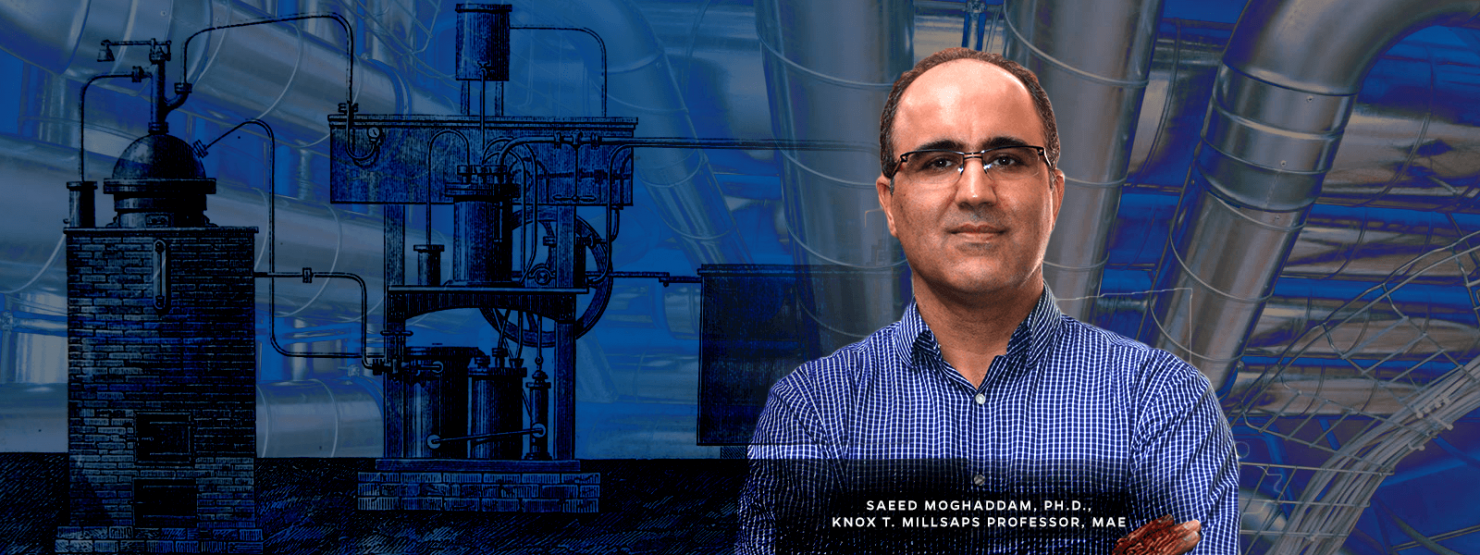Saeed Moghaddam, Ph.D., Knox T. Millsaps Professor of the UF Department of Mechanical and Aerospace Engineering, along with industry and organizational partners, has received a $1.89M grant from the U.S. Department of Energy (DOE). The group will be developing a breakthrough cooling and heating system based on a technology invented at UF’s Nanostructured Energy Systems Laboratories (NESLabs) directed by Moghaddam.
In undertaking this project, Moghaddam and his team are filling a critical gap in achieving a more renewable energy future. Traditional cooling and heat pumping systems that are at the heart of HVAC technology on the market today use electricity-driven compressors. An alternative heat-driven system, invented by Ferdinand Carré in 1858, existed and remained popular through the early 1900s but was replaced by compressor-based systems due to their higher efficiency, lower cost, and robustness. Inventions by Moghaddam’s team address these shortcomings of Carré’s system and provide efficiency comparable to the electricity-driven compressors.
Due to its high efficiency, this technology can be operated by resistive heating and still be as cost-effective as the electricity-driven compressors. However, Moghaddam’s system presents a fuel-agnostic hybrid cooling and heating system that operates with renewable electric energy from solar or wind sources when they are available and can switch to natural gas as the energy source at other times. The ability to use multiple sources of energy for operating the system solves the current challenge surrounding the inability to store adequate renewable electric energy for use during those times when there is insufficient wind or at night when there is no sun.
The extraordinary efficiency, in terms of the coefficient of performance (COP), of the technology is enabled by a new thermodynamic cycle as well as non-crystalizing ionic liquids. The favorable characteristics of the ionic liquids being used by Moghaddam’s group enable the absorption cycles within the HVAC system to operate at temperatures, efficiencies, and configurations not obtainable with conventional desiccants.
Under this research and development effort, UF will work with the Gas Technology Institute (GTI) and Modine Manufacturing researchers and engineers to integrate the new, more efficient cycle developed by UF within a standard enclosure in order to expedite entry of this technology to market. A prototype system will be built and tested at UF and GTI’s environmental chamber, where the system performance will be evaluated under a variety of conditions representative of all US climate zones.
Moghaddam commented, “We expect that, if proven successful, this technology can enter the market within 5 years. That hopefully means we will see significant improvement and a decided shift in the way we cool and heat our buildings, all while preserving our environment.” Cooling and heating are responsible for more than half of the energy expenditure in buildings. Moghaddam’s research aims to produce combined dehumidification and water heating for buildings, with the interchangeable use of renewable electric energy and natural gas.
Moghaddam and his partners are among 19 teams composed of universities, national laboratories, and companies that have been selected by the DOE to develop advanced building technologies under a $47.7 million federal funding initiative. The funding provided by the DOE’s Building Technologies Office enables the teams to research and develop innovative technologies that will improve energy productivity, flexibility, security and resiliency, as well as lower energy costs of our nation’s buildings and electric grid.
“The US Department of Energy is seeking reliable and versatile technologies to reduce our energy needs as we move forward to a more sustainable future,” said Forrest Masters, Ph.D. Associate Dean for Research and Facilities at the Herbert Wertheim College of Engineering. “With this grant, Dr. Moghaddam and his team have been recognized as being an important solution provider for this aim.”
